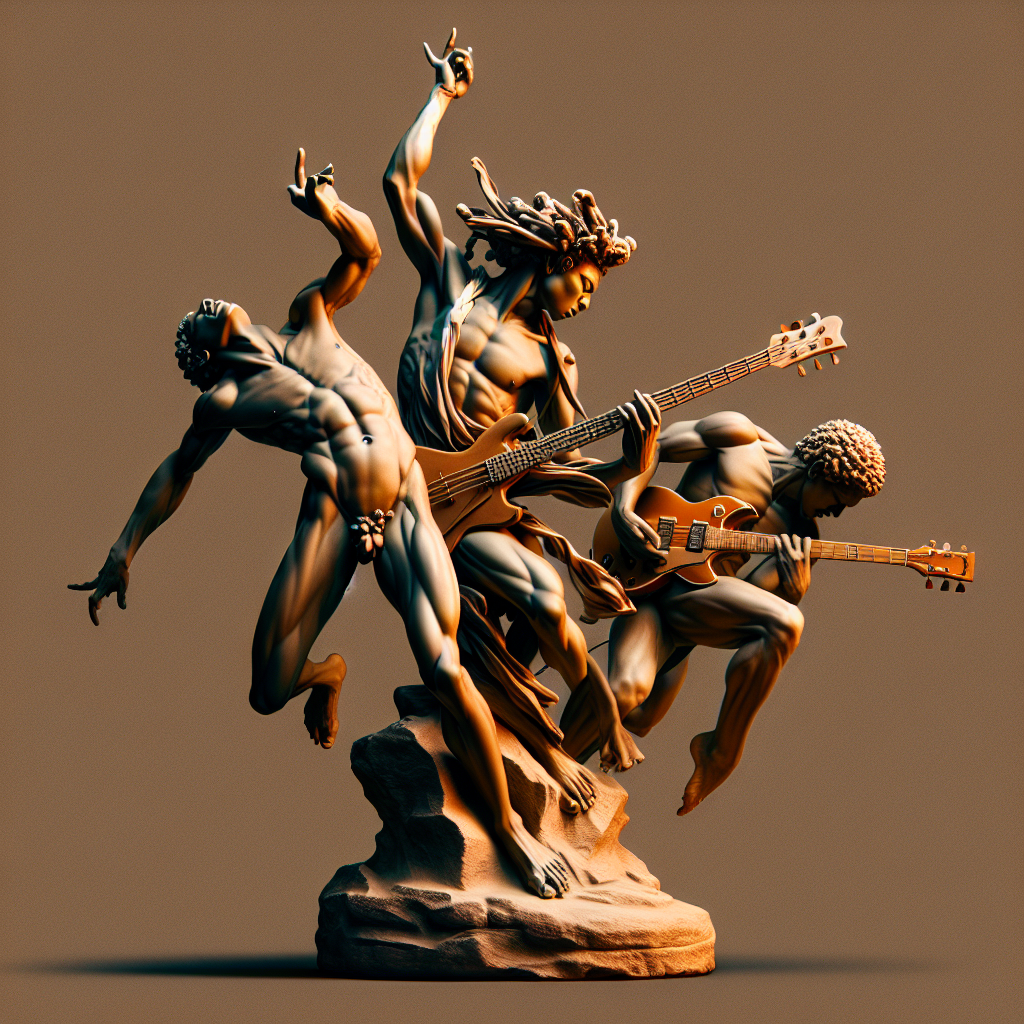-
Table of Contents
- Introduction
- The Origins Of Afro-Rock: Tracing The Roots Of African Beats In Rock Music
- Influential Afro-Rock Bands: Pioneers Of The Genre
- The Fusion Of Traditional African Rhythms And Rock: A Musical Revolution
- Iconic Afro-Rock Albums: Must-Listen Records That Define The Genre
- The Impact Of Afro-Rock On Global Music Culture
- Modern Afro-Rock Artists: Keeping The Legacy Alive
- Q&A
- Conclusion
“Rhythms Unleashed: Where African Beats Ignite Rock’s Soul”
Introduction
Afro-Rock, a vibrant and dynamic genre, represents a fusion of traditional African rhythms and the electrifying energy of rock music. Emerging in the late 1960s and 1970s, this genre became a powerful medium for cultural expression and innovation, blending the rich percussive elements and melodic structures of African music with the rebellious spirit and amplified sound of rock. Afro-Rock artists drew inspiration from a diverse array of influences, including highlife, Afrobeat, and psychedelic rock, creating a unique soundscape that resonated with audiences worldwide. This genre not only celebrated African musical heritage but also challenged and expanded the boundaries of rock music, paving the way for future generations of musicians to explore and integrate global sounds. Through its infectious rhythms and cross-cultural appeal, Afro-Rock continues to captivate listeners, offering a testament to the enduring power of musical hybridity and cultural exchange.
The Origins Of Afro-Rock: Tracing The Roots Of African Beats In Rock Music
The fusion of African beats with rock music, often referred to as Afro-rock, represents a fascinating intersection of cultural and musical traditions. This genre, which emerged prominently in the late 20th century, is a testament to the dynamic nature of music as a form of cultural expression and exchange. To understand the origins of Afro-rock, it is essential to trace the historical and musical pathways that led to this innovative blend.
The roots of Afro-rock can be traced back to the African continent, where music has always played a central role in cultural and social life. African music is characterized by its complex rhythms, polyrhythmic structures, and the use of traditional instruments such as the djembe, kora, and balafon. These elements create a rich tapestry of sound that is both deeply rhythmic and melodically intricate. As African musicians began to interact with Western musical traditions, particularly during the colonial and post-colonial periods, a new musical dialogue emerged. This exchange was facilitated by the movement of people and ideas across continents, leading to a cross-pollination of musical styles.
In the mid-20th century, as rock music gained global popularity, African musicians began to incorporate elements of rock into their own music. This was a period marked by significant political and social change across Africa, with many countries gaining independence and experiencing a resurgence of cultural pride. Musicians sought to express this newfound identity by blending traditional African sounds with contemporary influences. The electric guitar, a staple of rock music, became a symbol of this fusion, as it was adapted to play the intricate rhythms and melodies characteristic of African music.
One of the pioneering figures in the development of Afro-rock was Nigerian musician Fela Kuti. Known for his innovative Afrobeat style, Kuti combined elements of jazz, funk, and traditional African rhythms to create a sound that was both revolutionary and deeply rooted in African musical traditions. His work laid the groundwork for future generations of musicians who would continue to explore the possibilities of blending African beats with rock music.
As Afro-rock evolved, it began to influence musicians outside of Africa as well. Western rock bands, intrigued by the complex rhythms and unique sounds of African music, started to incorporate these elements into their own compositions. This was particularly evident in the 1980s, when artists such as Paul Simon and Peter Gabriel collaborated with African musicians, bringing Afro-rock to a wider audience. These collaborations not only highlighted the versatility and richness of African music but also demonstrated the universal appeal of its rhythms and melodies.
Today, Afro-rock continues to thrive as a genre that defies easy categorization. It is a testament to the power of music to transcend cultural boundaries and create new forms of artistic expression. By tracing the roots of Afro-rock, we gain a deeper understanding of how African beats have shaped and enriched the global music landscape. This genre serves as a reminder of the interconnectedness of cultures and the endless possibilities that arise when diverse musical traditions come together. As musicians continue to experiment and innovate, Afro-rock remains a vibrant and evolving testament to the enduring influence of African music in the world of rock.
Influential Afro-Rock Bands: Pioneers Of The Genre
Afro-Rock, a genre that seamlessly blends the rhythmic complexities of African music with the raw energy of rock, has carved out a unique niche in the global music landscape. This fusion not only highlights the versatility of African musical traditions but also underscores the universal appeal of rock music. The genre’s development can be attributed to several pioneering bands that have been instrumental in shaping its sound and expanding its reach. These influential Afro-Rock bands have not only contributed to the genre’s evolution but have also played a crucial role in bridging cultural divides through their innovative musical expressions.
One of the most notable bands in the Afro-Rock genre is Osibisa, a group that emerged in the late 1960s. Formed in London by musicians from Ghana and the Caribbean, Osibisa was among the first to introduce African rhythms to a Western audience. Their music, characterized by a vibrant blend of rock, jazz, and African highlife, captivated listeners with its infectious energy and intricate percussion. Osibisa’s success in the 1970s, marked by hits like “Sunshine Day” and “Dance the Body Music,” paved the way for other African artists to explore and experiment with rock music, thereby laying the groundwork for the Afro-Rock genre.
Transitioning from the pioneering efforts of Osibisa, another significant contributor to the Afro-Rock movement is the Nigerian band BLO. Formed in the early 1970s, BLO was known for its innovative approach to music, combining elements of funk, rock, and traditional African sounds. Their debut album, “Chapter One,” is often cited as a seminal work in the Afro-Rock genre, showcasing the band’s ability to merge Western rock influences with African musical traditions. BLO’s music not only resonated with audiences in Africa but also attracted attention from international listeners, further solidifying the global appeal of Afro-Rock.
In addition to Osibisa and BLO, the band Assagai also played a pivotal role in the development of Afro-Rock. Originating from South Africa, Assagai was known for its eclectic sound that incorporated elements of jazz, rock, and African rhythms. Their self-titled debut album, released in 1971, featured a dynamic mix of instrumental and vocal tracks that highlighted the band’s versatility and creativity. Assagai’s music was characterized by its intricate arrangements and powerful performances, which helped to elevate the status of Afro-Rock as a legitimate and influential genre.
Moreover, the influence of Afro-Rock extends beyond these pioneering bands, as it has inspired countless artists and musicians to explore the fusion of African and Western musical styles. The genre’s impact can be seen in the works of contemporary artists who continue to draw inspiration from the rich tapestry of sounds that Afro-Rock offers. This ongoing evolution of the genre underscores its enduring relevance and its ability to adapt to changing musical landscapes.
In conclusion, the pioneering efforts of bands like Osibisa, BLO, and Assagai have been instrumental in shaping the Afro-Rock genre. Through their innovative fusion of African rhythms and rock music, these bands have not only expanded the boundaries of musical expression but have also fostered a greater appreciation for the cultural diversity inherent in music. As Afro-Rock continues to evolve, it remains a testament to the power of music to transcend cultural barriers and unite people through shared artistic experiences.
The Fusion Of Traditional African Rhythms And Rock: A Musical Revolution

The fusion of traditional African rhythms and rock music represents a fascinating musical revolution that has captivated audiences and musicians alike. This unique blend, often referred to as Afro-rock, is a testament to the power of cultural exchange and the endless possibilities that arise when diverse musical traditions intersect. To understand the significance of Afro-rock, it is essential to explore the historical context and the elements that contribute to this innovative genre.
The roots of Afro-rock can be traced back to the mid-20th century, a period marked by significant social and political changes across the globe. As African nations gained independence, there was a burgeoning sense of cultural pride and a desire to assert a distinct identity. This cultural renaissance was mirrored in the music scene, where traditional African rhythms began to merge with Western musical styles. Rock music, with its rebellious spirit and global appeal, provided an ideal platform for this fusion. The result was a dynamic and vibrant genre that resonated with audiences both in Africa and beyond.
Central to the Afro-rock sound is the incorporation of traditional African rhythms, which are characterized by complex polyrhythms and syncopated beats. These rhythms, often played on indigenous instruments such as the djembe, talking drum, and balafon, bring a distinctive energy and texture to the music. When combined with the electric guitars, bass, and drums typical of rock music, these elements create a sound that is both familiar and refreshingly new. The interplay between these diverse musical components is what gives Afro-rock its unique identity and appeal.
Moreover, the lyrical content of Afro-rock often reflects the socio-political landscape of Africa, addressing themes such as freedom, unity, and social justice. This thematic focus not only adds depth to the music but also serves as a powerful tool for social commentary and change. By blending traditional African storytelling with the raw energy of rock, Afro-rock artists are able to convey messages that resonate deeply with their audiences.
The influence of Afro-rock extends beyond the African continent, as it has inspired numerous Western artists to incorporate African elements into their music. This cross-pollination of musical ideas has led to the emergence of sub-genres such as Afrobeat and Afrofunk, which further blur the lines between traditional and contemporary sounds. Artists like Fela Kuti and Osibisa have been instrumental in popularizing Afro-rock on the global stage, paving the way for future generations of musicians to explore this rich and diverse genre.
In addition to its cultural and musical significance, Afro-rock also represents a broader trend towards globalization and the breaking down of cultural barriers. As technology continues to facilitate the exchange of ideas and information, musicians are increasingly drawing inspiration from a wide array of sources, leading to the creation of new and exciting musical forms. Afro-rock is a prime example of how traditional and modern influences can come together to create something truly innovative and impactful.
In conclusion, the fusion of traditional African rhythms and rock music is a revolutionary development in the world of music. By combining the rich heritage of African musical traditions with the dynamic energy of rock, Afro-rock has carved out a unique niche that continues to inspire and captivate audiences worldwide. As this genre continues to evolve, it serves as a powerful reminder of the transformative potential of cultural exchange and the boundless creativity that arises when diverse musical traditions come together.
Iconic Afro-Rock Albums: Must-Listen Records That Define The Genre
Afro-Rock, a genre that seamlessly blends the rhythmic complexities of African music with the raw energy of rock, has carved out a unique niche in the global music landscape. This fusion not only highlights the versatility of African musical traditions but also underscores the universal appeal of rock music. To truly appreciate the depth and breadth of Afro-Rock, one must delve into the iconic albums that have defined and shaped the genre over the years. These records not only serve as a testament to the genre’s innovative spirit but also as a bridge connecting diverse musical cultures.
One of the seminal albums in the Afro-Rock genre is “Osibirock” by Osibisa, released in 1974. Osibisa, a band formed in London by Ghanaian and Caribbean musicians, played a pivotal role in popularizing Afro-Rock. Their music is characterized by a vibrant blend of African rhythms, rock guitar riffs, and jazz influences. “Osibirock” stands out for its infectious energy and intricate percussion, which together create a soundscape that is both exhilarating and deeply rooted in African musical traditions. The album’s tracks, such as “Welcome Home” and “The Coffee Song,” exemplify the band’s ability to merge different musical elements into a cohesive and compelling whole.
Transitioning from the vibrant sounds of Osibisa, another cornerstone of Afro-Rock is the album “Zombie” by Fela Kuti and Africa ’70, released in 1976. While Fela Kuti is often associated with Afrobeat, “Zombie” represents a critical intersection of Afrobeat and rock. The album’s title track, “Zombie,” is a politically charged masterpiece that combines the hypnotic grooves of Afrobeat with the rebellious spirit of rock. The driving force of the electric guitar, coupled with Kuti’s powerful saxophone and incisive lyrics, creates a sound that is both revolutionary and timeless. This album not only solidified Fela Kuti’s status as a musical innovator but also expanded the boundaries of what Afro-Rock could achieve.
As we explore further, it is essential to acknowledge the influence of the album “The Indestructible Beat of Soweto,” released in 1985. Although not strictly an Afro-Rock album, its impact on the genre is undeniable. This compilation introduced the world to the vibrant sounds of South African township music, which would later influence numerous Afro-Rock artists. The album’s fusion of traditional African rhythms with modern instrumentation provided a blueprint for future Afro-Rock musicians seeking to blend authenticity with innovation.
Moreover, the album “Heart of the Congos” by The Congos, released in 1977, offers another perspective on the Afro-Rock genre. While primarily a reggae album, its incorporation of African rhythms and harmonies illustrates the fluidity between genres and the shared musical heritage that Afro-Rock draws upon. The album’s rich vocal harmonies and intricate percussion reflect the deep connection between African music and other global genres, further enriching the Afro-Rock tapestry.
In conclusion, these iconic albums not only define Afro-Rock but also highlight the genre’s ability to transcend cultural and musical boundaries. Through the fusion of African rhythms and rock elements, Afro-Rock has created a dynamic and evolving sound that continues to inspire musicians and captivate audiences worldwide. As we listen to these must-hear records, we are reminded of the power of music to unite diverse traditions and create something truly extraordinary.
The Impact Of Afro-Rock On Global Music Culture
Afro-Rock, a fusion of African musical elements with rock music, has significantly influenced global music culture, creating a unique sound that resonates across continents. This genre emerged during the late 1960s and early 1970s, a period marked by cultural exchange and experimentation in the music world. As African musicians began to incorporate electric guitars and Western rock rhythms into their traditional sounds, a new musical hybrid was born, characterized by its vibrant energy and rhythmic complexity. The impact of Afro-Rock on global music culture is profound, as it has not only enriched the rock genre but also broadened the horizons of musical expression worldwide.
To understand the influence of Afro-Rock, it is essential to consider the historical context in which it developed. During the post-colonial era, African nations were experiencing a cultural renaissance, seeking to reclaim and redefine their identities. Music became a powerful medium for this expression, and African artists began to experiment with blending indigenous sounds with Western influences. This fusion was not merely a superficial combination of styles but a deep, innovative integration that respected the roots of both traditions. As a result, Afro-Rock emerged as a genre that celebrated African heritage while embracing modernity.
One of the most significant contributions of Afro-Rock to global music culture is its rhythmic innovation. African music is renowned for its complex polyrhythms, which have been seamlessly integrated into the rock framework, challenging and expanding the rhythmic possibilities of the genre. This rhythmic complexity has inspired countless musicians worldwide, encouraging them to explore new time signatures and syncopations. Consequently, Afro-Rock has played a crucial role in the evolution of progressive rock and other experimental music forms, pushing the boundaries of what rock music can be.
Moreover, Afro-Rock has facilitated a greater appreciation for African musical traditions on the global stage. By incorporating African elements into a widely popular genre like rock, Afro-Rock has introduced audiences to the rich tapestry of African music, fostering cross-cultural understanding and appreciation. This exposure has led to increased interest in African music and has paved the way for other African genres, such as Afrobeat and Highlife, to gain international recognition. In this way, Afro-Rock has acted as a cultural ambassador, bridging the gap between African and Western musical traditions.
Furthermore, the influence of Afro-Rock extends beyond the realm of music, impacting global culture and society. The genre has often been associated with themes of social justice and political activism, reflecting the struggles and aspirations of African people. This aspect of Afro-Rock has resonated with audiences worldwide, inspiring movements for change and solidarity. By addressing universal themes through a distinct cultural lens, Afro-Rock has contributed to a global dialogue on issues such as equality, freedom, and identity.
In conclusion, the impact of Afro-Rock on global music culture is both profound and multifaceted. By blending African rhythms and melodies with rock music, Afro-Rock has not only enriched the musical landscape but also fostered cross-cultural understanding and dialogue. Its rhythmic innovations have inspired musicians across genres, while its cultural significance has resonated with audiences worldwide. As a testament to the power of musical fusion, Afro-Rock continues to influence and inspire, leaving an indelible mark on the world of music and beyond.
Modern Afro-Rock Artists: Keeping The Legacy Alive
Afro-Rock, a genre that fuses traditional African rhythms with the raw energy of rock music, has seen a resurgence in recent years, thanks to a new wave of artists who are dedicated to keeping the legacy alive. This genre, which emerged in the late 1960s and 1970s, was initially popularized by pioneering bands like Osibisa and Blo, who skillfully blended African musical elements with rock’s electric guitar riffs and driving beats. Today, modern Afro-Rock artists are not only preserving this rich musical heritage but also innovating and expanding its boundaries, ensuring its relevance in the contemporary music scene.
One of the key factors contributing to the revival of Afro-Rock is the globalized nature of today’s music industry. With the advent of digital platforms, artists from different parts of the world can easily share their music and collaborate with others, leading to a cross-pollination of ideas and styles. This has allowed Afro-Rock musicians to reach a wider audience and draw inspiration from a diverse array of influences. Consequently, modern Afro-Rock artists are able to incorporate elements from various genres, such as jazz, funk, and electronic music, into their work, creating a sound that is both fresh and rooted in tradition.
Moreover, the socio-political climate of the 21st century has also played a significant role in the resurgence of Afro-Rock. Many contemporary artists are using their music as a platform to address pressing issues such as social justice, identity, and cultural heritage. By doing so, they are not only honoring the genre’s legacy of activism and resistance but also making it relevant to today’s audiences. This has resonated with listeners who are seeking music that is not only entertaining but also thought-provoking and meaningful.
In addition to these factors, the rise of music festivals and live performances has provided a fertile ground for Afro-Rock artists to showcase their talents. Events such as AfroPunk and WOMAD have become important platforms for these musicians to connect with fans and fellow artists, fostering a sense of community and collaboration. These festivals celebrate diversity and inclusivity, offering a space where Afro-Rock can thrive and evolve. As a result, artists are able to experiment with their sound and push the boundaries of the genre, while still maintaining its core essence.
Furthermore, the influence of technology cannot be overlooked in the evolution of modern Afro-Rock. With access to advanced recording equipment and software, artists can now produce high-quality music from virtually anywhere in the world. This has democratized the music-making process, allowing more voices to be heard and contributing to the genre’s growth and diversification. Additionally, social media platforms have enabled artists to engage directly with their audience, building a loyal fan base and fostering a sense of connection and community.
In conclusion, the legacy of Afro-Rock is being kept alive by a new generation of artists who are both preserving its rich history and pushing its boundaries. Through the fusion of traditional African rhythms with contemporary influences, these musicians are creating a sound that is both innovative and deeply rooted in cultural heritage. As they continue to address important social issues and connect with audiences worldwide, modern Afro-Rock artists are ensuring that this vibrant genre remains a vital and dynamic force in the global music landscape.
Q&A
1. **What is Afro-Rock?**
Afro-Rock is a genre that blends traditional African musical elements with rock music, incorporating African rhythms, instruments, and melodies into the rock framework.
2. **Who are some notable Afro-Rock artists?**
Notable Afro-Rock artists include Osibisa, BLO, and The Funkees, who have been influential in merging African sounds with rock music.
3. **What are common instruments used in Afro-Rock?**
Common instruments in Afro-Rock include electric guitars, drums, and bass, alongside traditional African instruments like the djembe, talking drum, and kora.
4. **How did Afro-Rock emerge?**
Afro-Rock emerged in the late 1960s and 1970s as African musicians began experimenting with rock music, influenced by the global rock scene and local African musical traditions.
5. **What are some key albums in Afro-Rock?**
Key albums in Afro-Rock include “Osibisa” by Osibisa, “Chapter One” by BLO, and “Point of No Return” by The Funkees, which showcase the fusion of African and rock elements.
6. **How has Afro-Rock influenced modern music?**
Afro-Rock has influenced modern music by paving the way for the integration of diverse cultural sounds, inspiring genres like Afrobeat and influencing artists who blend global musical styles.
Conclusion
Afro-Rock, a fusion of African musical elements with rock music, represents a dynamic and innovative genre that bridges cultural and musical traditions. Emerging prominently in the late 1960s and 1970s, Afro-Rock incorporates traditional African rhythms, instruments, and vocal styles with the electric guitars, bass, and drums typical of rock music. This genre not only highlights the versatility and adaptability of African music but also underscores the global influence of African culture. Bands like Osibisa and artists such as Fela Kuti played pivotal roles in popularizing Afro-Rock, creating a sound that is both distinct and universally appealing. The genre has contributed significantly to the diversification of rock music, enriching it with complex polyrhythms and vibrant melodies. Afro-Rock continues to inspire contemporary musicians, fostering cross-cultural collaborations and promoting a deeper appreciation for African musical heritage within the global music scene.




